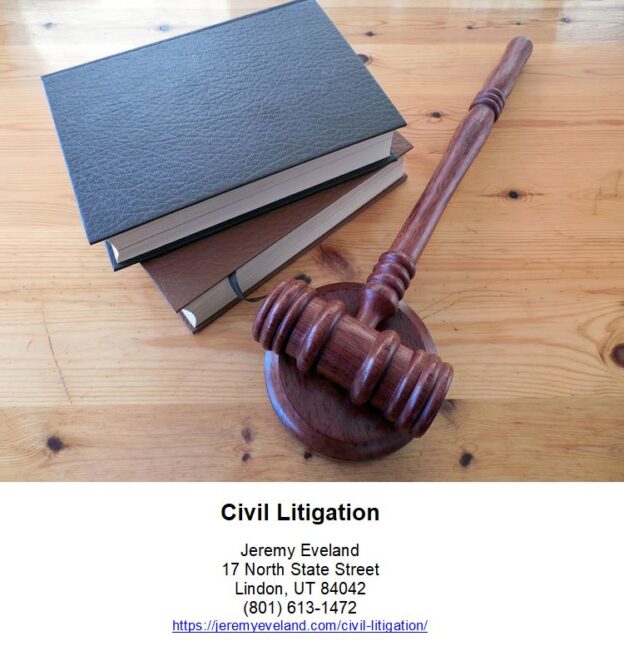-
Utah Lawyer
- Introduction
- The Benefits of Working with a Full Service Law Firm
- How to Choose the Right Full Service Law Firm for Your Needs
- The Role of Technology in Full Service Law Firms
- The Advantages of Outsourcing Legal Services to a Full Service Law Firm
- Understanding the Different Types of Services Offered by Full Service Law Firms
- Q&A
“Full Service Law Firm: Your Legal Solutions, Our Expertise.”
Introduction
A full service law firm is a legal practice that provides a wide range of legal services to its clients. These services can include litigation, corporate law, tax law, real estate law, family law, and more. Full service law firms are typically staffed with experienced attorneys who specialize in different areas of the law. These attorneys work together to provide comprehensive legal advice and representation to their clients. Full service law firms are often sought out by businesses and individuals who need legal assistance in multiple areas of the law. They provide a one-stop shop for all of their clients’ legal needs.
The Benefits of Working with a Full Service Law Firm
Working with a full service law firm can provide a number of benefits to individuals and businesses alike. A full service law firm is one that offers a wide range of legal services, from litigation to transactional work. By working with a full service law firm, clients can benefit from the expertise of a team of attorneys who specialize in different areas of the law.
One of the primary benefits of working with a full service law firm is the ability to access a wide range of legal services. A full service law firm can provide assistance with a variety of legal matters, from contract drafting and review to litigation and dispute resolution. This allows clients to have access to the expertise of attorneys who specialize in different areas of the law, ensuring that their legal needs are met.
Another benefit of working with a full service law firm is the ability to access a team of attorneys. By working with a full service law firm, clients can benefit from the collective knowledge and experience of a team of attorneys. This allows clients to have access to a variety of legal perspectives, which can be invaluable when dealing with complex legal matters.
Finally, working with a full service law firm can provide clients with cost savings. By working with a full service law firm, clients can benefit from the economies of scale that come with having a team of attorneys working on their behalf. This can result in cost savings for clients, as they will not have to pay for the services of multiple attorneys.
In conclusion, working with a full service law firm can provide a number of benefits to individuals and businesses alike. By working with a full service law firm, clients can benefit from the expertise of a team of attorneys who specialize in different areas of the law, access a team of attorneys, and potentially save money. For these reasons, working with a full service law firm can be a great option for those seeking legal assistance.
How to Choose the Right Full Service Law Firm for Your Needs
When it comes to selecting a full service law firm, it is important to take the time to research and evaluate the options available to you. A full service law firm can provide a wide range of legal services, from business and corporate law to family law and estate planning. It is important to choose a firm that has the experience and expertise to handle your specific legal needs. Here are some tips to help you choose the right full service law firm for your needs.
1. Research the Firm: Before selecting a full service law firm, it is important to research the firm’s background and experience. Look for a firm that has a proven track record of success in the areas of law that you need assistance with. Check out the firm’s website and read reviews from past clients to get an idea of the quality of service they provide.
2. Ask for Referrals: Ask friends, family, and colleagues for referrals to full service law firms they have used in the past. This can be a great way to get an honest opinion about the quality of service provided by a particular firm.
3. Meet with the Firm: Once you have narrowed down your list of potential firms, it is important to meet with them in person. This will give you the opportunity to ask questions and get a better understanding of the firm’s capabilities.
4. Consider Cost: Cost is an important factor to consider when selecting a full service law firm. Make sure to ask about the firm’s fees and payment options before making a decision.
By taking the time to research and evaluate your options, you can ensure that you select the right full service law firm for your needs. With the right firm on your side, you can rest assured that your legal needs will be taken care of in a professional and efficient manner.
The Role of Technology in Full Service Law Firms
The role of technology in full service law firms is becoming increasingly important. Technology has the potential to revolutionize the way law firms operate, from the way they manage their client relationships to the way they handle their day-to-day operations. By leveraging technology, law firms can improve their efficiency, reduce costs, and provide better service to their clients.
One of the most important ways technology can help law firms is by streamlining their client management processes. Technology can help law firms manage their client relationships more effectively by providing them with tools to track client information, manage documents, and communicate with clients. This can help law firms stay organized and ensure that they are providing the best possible service to their clients.
Technology can also help law firms improve their efficiency. By leveraging technology, law firms can automate many of their processes, such as document management, billing, and client communication. This can help law firms save time and money, as well as improve their overall efficiency.
Finally, technology can help law firms provide better service to their clients. By leveraging technology, law firms can provide their clients with access to their documents and information in real-time. This can help law firms stay connected with their clients and ensure that they are providing the best possible service.
In conclusion, technology is playing an increasingly important role in full service law firms. By leveraging technology, law firms can improve their efficiency, reduce costs, and provide better service to their clients. Technology can help law firms manage their client relationships more effectively, automate their processes, and provide their clients with access to their documents and information in real-time. By taking advantage of the opportunities that technology provides, law firms can ensure that they are providing the best possible service to their clients.
The Advantages of Outsourcing Legal Services to a Full Service Law Firm
Outsourcing legal services to a full service law firm can provide a number of advantages for businesses. By leveraging the expertise of a full service law firm, businesses can benefit from a wide range of legal services, including contract drafting and review, litigation support, and corporate governance. Additionally, outsourcing legal services to a full service law firm can help businesses save time and money.
First, a full service law firm can provide a wide range of legal services. This includes contract drafting and review, which can help businesses ensure that their contracts are legally sound and protect their interests. Additionally, a full service law firm can provide litigation support, which can help businesses navigate the complexities of the legal system and protect their rights in court. Finally, a full service law firm can provide corporate governance services, which can help businesses ensure that their operations are compliant with applicable laws and regulations.
Second, outsourcing legal services to a full service law firm can help businesses save time and money. By leveraging the expertise of a full service law firm, businesses can avoid the need to hire and train in-house legal staff. This can help businesses save on personnel costs and free up resources for other areas of the business. Additionally, a full service law firm can provide timely and cost-effective legal services, which can help businesses save on legal fees.
In conclusion, outsourcing legal services to a full service law firm can provide a number of advantages for businesses. By leveraging the expertise of a full service law firm, businesses can benefit from a wide range of legal services, including contract drafting and review, litigation support, and corporate governance. Additionally, outsourcing legal services to a full service law firm can help businesses save time and money.
Understanding the Different Types of Services Offered by Full Service Law Firms
Full service law firms offer a wide range of services to their clients. These services can include legal advice, litigation, contract drafting, and more. Understanding the different types of services offered by full service law firms can help you make an informed decision when selecting a firm to represent you.
Legal Advice: Full service law firms provide legal advice to their clients. This advice can range from general advice on legal matters to more specific advice on a particular issue. The attorneys at a full service law firm can provide advice on a variety of topics, including business law, family law, real estate law, and more.
Litigation: Full service law firms also provide litigation services. This includes representing clients in court, filing motions, and negotiating settlements. Attorneys at full service law firms are experienced in all aspects of litigation and can provide effective representation for their clients.
Contract Drafting: Full service law firms can also provide contract drafting services. This includes drafting contracts for business transactions, real estate transactions, and other legal matters. The attorneys at a full service law firm can ensure that the contracts are legally binding and protect the interests of their clients.
Research: Full service law firms also provide research services. This includes researching legal issues, researching case law, and researching statutes. The attorneys at a full service law firm can provide comprehensive research services to their clients.
Document Preparation: Full service law firms can also provide document preparation services. This includes preparing legal documents, such as wills, trusts, and contracts. The attorneys at a full service law firm can ensure that the documents are properly prepared and legally binding.
These are just a few of the services offered by full service law firms. Understanding the different types of services offered by full service law firms can help you make an informed decision when selecting a firm to represent you.
Q&A
1. What is a full service law firm?
A full service law firm is a legal practice that provides a wide range of legal services to its clients. These services may include litigation, corporate law, tax law, real estate law, family law, and more.
2. What types of clients do full service law firms typically serve?
Full service law firms typically serve a wide range of clients, including individuals, businesses, and organizations.
3. What are the benefits of using a full service law firm?
The benefits of using a full service law firm include access to a wide range of legal services, experienced attorneys, and the ability to develop a long-term relationship with the firm.
4. How do I find a full service law firm?
You can find a full service law firm by searching online, asking for referrals from friends or colleagues, or contacting your local bar association.
5. What should I look for when choosing a full service law firm?
When choosing a full service law firm, you should look for a firm that has experience in the areas of law that you need, a good reputation, and reasonable fees. You should also make sure that the attorneys at the firm are knowledgeable and have good communication skills.
Full Service Law Firm Consultation
When you need help from a Full Service Law Firm call Jeremy D. Eveland, MBA, JD (801) 613-1472 for a consultation.
Jeremy Eveland
17 North State Street
Lindon UT 84042
(801) 613-1472
Related Posts
Do I Need A Board of Directors?
Estate Planning Lawyer West Valley City Utah
Business Contract Lawyer Spanish Fork
Corporate Attorney Riverton Utah





















